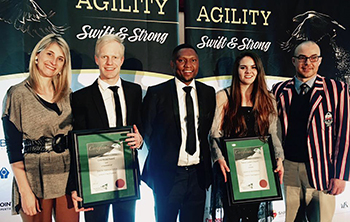
Celebrating big achievements in the construction
sector at the recent Association of South African
Quantity Surveyors (ASAQS) conference are, from
the left: Cameron Ferreira, junior lecturer in the
UFS Department of Quantity Surveying,
Jhon Thatcher, former UFS student in the same
department who was the second runner-up for the
Gold Medal Award, Dr Stephan Ramabodu, President
of ASAQS, Gerné Bothma, former student in the
department and winner of the Future Leaders’
Award 2017, and Pierre Oosthuizen, UFS lecturer in
the same department.
Photos: Supplied
The Department of Quantity Surveying and Construction Management at the University of the Free State (UFS) made good on its promise to develop independent and critical-thinking graduates who will become leaders in their field. At the recent Association of South African Quantity Surveyors (ASAQS) conference and gala dinner, two students from the department, Gerné Botma and Jhon Thatcher, received awards for their outstanding performance.
Best of the best
Botma received the ASAQS Future Leaders’ Award (2017), an award based on academic achievement in the first three years of study. He competed with nominees from universities across South Africa offering Quantity Surveying programmes, and was the winner in this category.
Thatcher was a second runner-up for the ASAQS Gold Medal Award (being in the top three Quantity Surveying students in South Africa). This is awarded on a number of criteria, including academic achievement. Fourth-year students from all the universities in South Africa offering Quantity Surveying programmes compete for this award, and must display achievement in categories such as academia, leadership, community engagement, and general interests. In 2016, the Gold Medal Award was won by the UFS student, Kamogelo Leeuw.
Keeping abreast of developments
Today, organisations are relying on its members to stay ahead of issues, technologies, innovations and trends. In Quantity Surveying, to keep abreast of developments in the built environment, ASAQS was established as a voluntary association, with one of its goals being advancing and promoting the science and practice of Quantity Surveying. ASAQS works in close collaboration with its member firms, tertiary institutions, and the South African Council for Quantity Surveying Professions (SACQSP), a statutory body that oversees and regulates the profession, and accredit Quantity Surveying programmes in South Africa.
Two staff members from the UFS Department of Quantity Surveying and Construction Management, Cameron Ferreira and Pierre Oosthuizen, attended the recent ASAQS annual conference. Ferreira, a junior lecturer in the department, is the current Chapter Chairperson of the Free State for ASAQS and Oosthuizen, a lecturer in the department, is the former Chapter Chairperson.
According to Ferreira, they attended the conference to keep abreast of the latest development within the industry. “The event also served as a great networking opportunity for the UFS to build partnerships with other industry pioneers,” she said. Making use of opportunities such as these is in line with the UFS’s pursuit of lifelong learning.